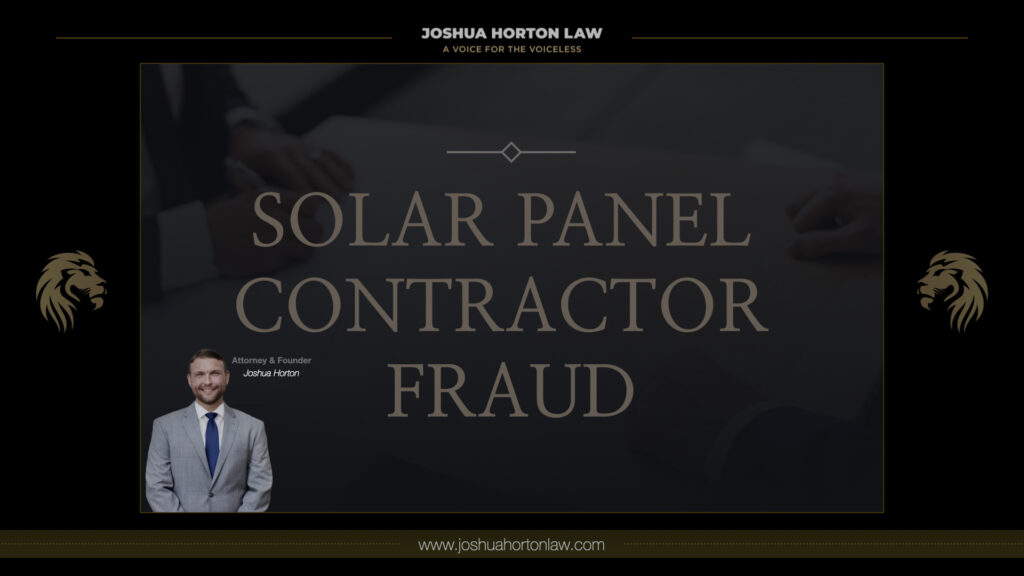Solar Panel Contractor Fraud

[et_pb_section fb_built=”1″ admin_label=”Header” _builder_version=”4.20.0″ _module_preset=”default” use_background_color_gradient=”on” background_color_gradient_stops=”rgba(31,35,44,0.7) 0%|gcid-9fa4a1b6-767d-41ca-984c-a6f10449c843 100%” background_color_gradient_overlays_image=”on” background_image=”https://joshuahortonlaw.com/wp-content/uploads/2023/09/attorney-21.jpg” width=”100%” custom_margin=”|-162px|-7px|||” custom_padding=”|0px||||” locked=”off” collapsed=”on” global_colors_info=”{%22gcid-9fa4a1b6-767d-41ca-984c-a6f10449c843%22:%91%22background_color_gradient_stops%22%93}”][et_pb_row _builder_version=”4.20.0″ _module_preset=”default” global_colors_info=”{}”][et_pb_column type=”4_4″ _builder_version=”4.20.0″ _module_preset=”default” global_colors_info=”{}”][et_pb_image src=”https://joshuahortonlaw.com/wp-content/uploads/2023/09/attorney-1.png” title_text=”attorney-1″ _builder_version=”4.20.0″ _module_preset=”default” max_width=”130px” module_alignment=”center” global_colors_info=”{}”][/et_pb_image][et_pb_text _builder_version=”4.21.0″ _module_preset=”45b74653-21bb-42aa-8ddf-ec61fe57bb47″ header_text_color=”gcid-11d3dbbb-f6dc-4fb8-929b-9d6994368d00″ text_orientation=”center” global_colors_info=”{%22gcid-11d3dbbb-f6dc-4fb8-929b-9d6994368d00%22:%91%22header_text_color%22%93}”]
Solar Panel Contractor Fraud
[/et_pb_text][/et_pb_column][/et_pb_row][/et_pb_section][et_pb_section fb_built=”1″ admin_label=”Service Info” _builder_version=”4.20.0″ _module_preset=”default” background_color=”gcid-9fa4a1b6-767d-41ca-984c-a6f10449c843″ width=”100%” min_height=”2316.3px” custom_margin=”||-94px|||” custom_padding=”|15px||||” collapsed=”on” global_colors_info=”{%22gcid-9fa4a1b6-767d-41ca-984c-a6f10449c843%22:%91%22background_color%22%93}”][et_pb_row custom_padding_last_edited=”on|desktop” _builder_version=”4.20.0″ _module_preset=”default” custom_padding=”30px|60px|30px|60px|true|true” custom_padding_tablet=”|40px||40px|false|true” custom_padding_phone=”20px|20px|20px|20px|true|true” border_color_all=”gcid-11d3dbbb-f6dc-4fb8-929b-9d6994368d00″ border_width_left=”5px” global_colors_info=”{%22gcid-11d3dbbb-f6dc-4fb8-929b-9d6994368d00%22:%91%22border_color_all%22%93}”][et_pb_column type=”4_4″ _builder_version=”4.20.0″ _module_preset=”default” global_colors_info=”{}”][et_pb_text _builder_version=”4.21.0″ _module_preset=”f1ea692d-4d71-48ad-8f28-60deaf6ae634″ text_text_color=”#FFFFFF” global_colors_info=”{}”]
Solar panel contractor fraud is a growing concern in the renewable energy industry, and it’s not just the contractors who may be held accountable. Lenders who finance these projects may also find themselves implicated in cases of fraud. One powerful tool in the hands of consumers to seek recourse is the Federal Trade Commission (FTC) Holder Rule. In this article, we’ll explore what the FTC Holder Rule is, how it can be used to implicate lenders in solar panel contractor fraud, and what consumers can do to protect themselves.
[/et_pb_text][/et_pb_column][/et_pb_row][et_pb_row column_structure=”1_4,3_4″ _builder_version=”4.21.0″ _module_preset=”default” min_height=”342px” custom_padding=”||0px|||” global_colors_info=”{}”][et_pb_column type=”1_4″ _builder_version=”4.20.0″ _module_preset=”default” global_colors_info=”{}”][et_pb_text _builder_version=”4.21.0″ _module_preset=”87269926-0c92-42f6-9826-bfbd20ab324c” custom_margin=”|-27px||||” global_colors_info=”{%22gcid-11d3dbbb-f6dc-4fb8-929b-9d6994368d00%22:%91%22header_4_text_color%22%93}”]
The FTC Holder Rule Explained
[/et_pb_text][/et_pb_column][et_pb_column type=”3_4″ _builder_version=”4.20.0″ _module_preset=”default” global_colors_info=”{}”][et_pb_text _builder_version=”4.21.0″ _module_preset=”f1ea692d-4d71-48ad-8f28-60deaf6ae634″ text_text_color=”#FFFFFF” min_height=”43px” custom_margin=”-33px|||||” custom_padding=”|||1px||” global_colors_info=”{}”]
The FTC Holder Rule is a regulation enacted by the Federal Trade Commission to protect consumers who purchase goods or services using credit, such as loans or financing. It holds the lender or creditor responsible for the actions of the seller or contractor. In the context of solar panel contractor fraud, the FTC Holder Rule means that if a consumer enters into a financing agreement for a solar panel installation and the contractor engages in deceptive or fraudulent practices, the lender can be held accountable.
[/et_pb_text][et_pb_text _builder_version=”4.21.0″ _module_preset=”87269926-0c92-42f6-9826-bfbd20ab324c” min_height=”6px” custom_margin=”||50px|||” locked=”off” global_colors_info=”{%22gcid-11d3dbbb-f6dc-4fb8-929b-9d6994368d00%22:%91%22header_4_text_color%22%93}”]
How Lenders Can Be Implicated
[/et_pb_text][et_pb_text _builder_version=”4.21.0″ _module_preset=”default” custom_margin=”-46px|||||” global_colors_info=”{}”]
Lenders can be implicated in solar panel contractor fraud cases under the FTC Holder Rule when certain conditions are met:
1. Deceptive Practices by Contractor: If the solar panel contractor engages in deceptive practices, such as misrepresenting the efficiency or cost savings of the solar panels, the lender may be implicated if they were aware or should have been aware of these deceptive practices.
2. Knowledge or Reason to Know: The FTC Holder Rule doesn’t require lenders to be directly involved in the contractor’s fraud. It only requires that they have knowledge or reason to know about the contractor’s deceptive practices. If a lender turns a blind eye to red flags or fails to conduct due diligence on the contractors they finance, they could be implicated.
3. Misrepresentation in Financing Documents: If the lender is aware that the financing documents contain false information about the solar panel installation, such as inflated costs or exaggerated savings, they can be held accountable for facilitating fraudulent transactions.
4. Failure to Investigate Consumer Complaints: Lenders have a responsibility to investigate and address consumer complaints related to fraudulent solar panel installations. Failure to do so may implicate them in the fraud.
[/et_pb_text][et_pb_text _builder_version=”4.21.0″ _module_preset=”87269926-0c92-42f6-9826-bfbd20ab324c” min_height=”31px” custom_margin=”9px||9px||true|” locked=”off” global_colors_info=”{%22gcid-11d3dbbb-f6dc-4fb8-929b-9d6994368d00%22:%91%22header_4_text_color%22%93}”]
Consumers have several protections under the FTC Holder Rule:
[/et_pb_text][et_pb_text _builder_version=”4.21.0″ _module_preset=”default” global_colors_info=”{}”]
Right to Sue: Consumers have the right to sue both the contractor and the lender if they have been victims of solar panel contractor fraud.
Recourse for Damages: If consumers can prove that the contractor and lender engaged in deceptive practices, they may be entitled to damages, including the costs of the solar panel installation and any associated damages.
Right to Rescind the Loan: Consumers can also have the right to rescind the loan agreement if they discover that they have been victims of fraud.
Reporting to Regulatory Authorities: Consumers can report fraudulent practices by contractors and lenders to the FTC and other relevant regulatory authorities.
[/et_pb_text][/et_pb_column][/et_pb_row][et_pb_row _builder_version=”4.21.0″ _module_preset=”default” min_height=”316px” global_colors_info=”{}”][et_pb_column type=”4_4″ _builder_version=”4.21.0″ _module_preset=”default” global_colors_info=”{}”][et_pb_text _builder_version=”4.21.0″ _module_preset=”87269926-0c92-42f6-9826-bfbd20ab324c” min_height=”31px” custom_margin=”9px||9px||true|” locked=”off” global_colors_info=”{%22gcid-11d3dbbb-f6dc-4fb8-929b-9d6994368d00%22:%91%22header_4_text_color%22%93}”]
To Protect yourself as a consumer
[/et_pb_text][et_pb_text _builder_version=”4.21.0″ _module_preset=”default” global_colors_info=”{}”]
Research Contractors: Before entering into a solar panel installation agreement, research the contractor’s reputation and check for reviews and complaints.
Review Financing Documents Carefully: Read and review all financing documents carefully, and ensure they accurately reflect the terms and costs of the installation.
Document Everything: Keep records of all communications, contracts, and documentation related to the installation.
Report Suspected Fraud: If you suspect fraud, report it to the FTC, your state’s attorney general, and the lender.
Solar panel contractor fraud is a serious issue, and the FTC Holder Rule provides a means for consumers to seek recourse not only against deceptive contractors but also against lenders who may be complicit. Consumers should be vigilant, conduct due diligence, and take action to protect themselves from fraudulent practices in the solar panel industry.
[/et_pb_text][/et_pb_column][/et_pb_row][/et_pb_section]
